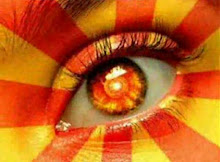There's almost nothing in the state of Macedonia that's not contested, including (if you ask the Greek Government) their name and (if you ask the Bulgarian Government) the existence of Macedonian as an ethnicity or language! Not to mention those pesky religious conflicts--a daily affair in a country with a 33% Muslim population coexisting with a 64.7% Macedonian Orthodox population... And those pesky Catholics occasionally show up and cause problems.
Macedonia is indeed a bit of a mixed-up country in an ethnic and linguistic context. The state's population of 2.038 million (as of 2006) was comprised of 1.2 million people who identified as ethnic Macedonians, while the remainder were Albanian, Turkish, Romani, Serbian...heck, even a few Bulgarians. Interestingly, the Macedonian information agency has been known to count only ethnic Macedonians in many of its statistics, inflating income stats to make it look like they've got more GDP per capita than the 8400USD the CIA says they have.
The MIA is also quick to point out the great cultural traditions of Ethnic Macedonians, the people that Bulgaria says don't exist. Poetry is a big national pastime, as well as folk dances an Emo Techno.Many Macedonians celebrate Christian holidays in Orthodox tradition. Most sites don't mention this, but since 1/3 of the population is Muslim, I'm guessing that there are a few Muslim cultural traditions in there somewhere...
Here's Some EMO TECHNO!!!
Macedonia's history is characterized by chaos. The territory that comprises the modern state of Macedonia has passed through so many hands and experienced so many population shifts that nobody except a nationalistic government would dare claim credit for all the land's history... Of course the government claims just that. Did I mention that Mike Ilitch, the founcer of Little Caesar's Pizza, is Macedonian?
During the Hellenistic period, Alexander the Great's hometown was in the vicinity of Skopje, and the Roman emperor Justinian was born there too. Several Bulgarian empires controlled the land during the middle ages between occupations by Serbian-speaking people. The MIA notes proudly that for a time in the 1300s, the small country's territory played host to the capital of Czar Stefan Dusan's Serbian Empire (Not that anyone's ever heard of that). From the 1400s onward, the Ottoman Empire controlled the entire area, giving rise to a significant local Turkish population as well as causing many people to convert to Islam.
The concept of a "Macedonian" national identity did not come into play until after the First World War with the creation of a Yugoslavian state. During the Second World War, the Axis powers controlled the area and victimized many minorities, including the small but significant Jewish population. After this period, the area was considered to be on "the other side of the Iron Curtain." Then, on September 8, 1991, Macedonia peacefully seceded from Yugoslavia and everybody was happy for ever after...
There were a few ethnic tensions, though. People who identify as Bulgarians have repeatedly tried to secede from the state in the Northeast Region, as do Albanians in the West. During the Kosovo conflict in 1998-1999, 360 thousand ethnic Albanians took refuge in Macedonian territories. These Albanians then tried to break off and form a separate state. By 2005, after some interventions by NATO troops, the perfectly peaceful and democratic "Former Yugoslav Republic of Macedonia" (as the Greeks insist it be called) started EU membership negotiation.
Now the illustrious Former Yugoslav Republic, in additon to cultivating bids for NATO and the EU, has joined the Organization for Security and Cooperation in Europe, The Council of Europe, the WTO, and inexplicably, La Francophonie.
Sunday, February 17, 2008
Subscribe to:
Post Comments (Atom)

No comments:
Post a Comment